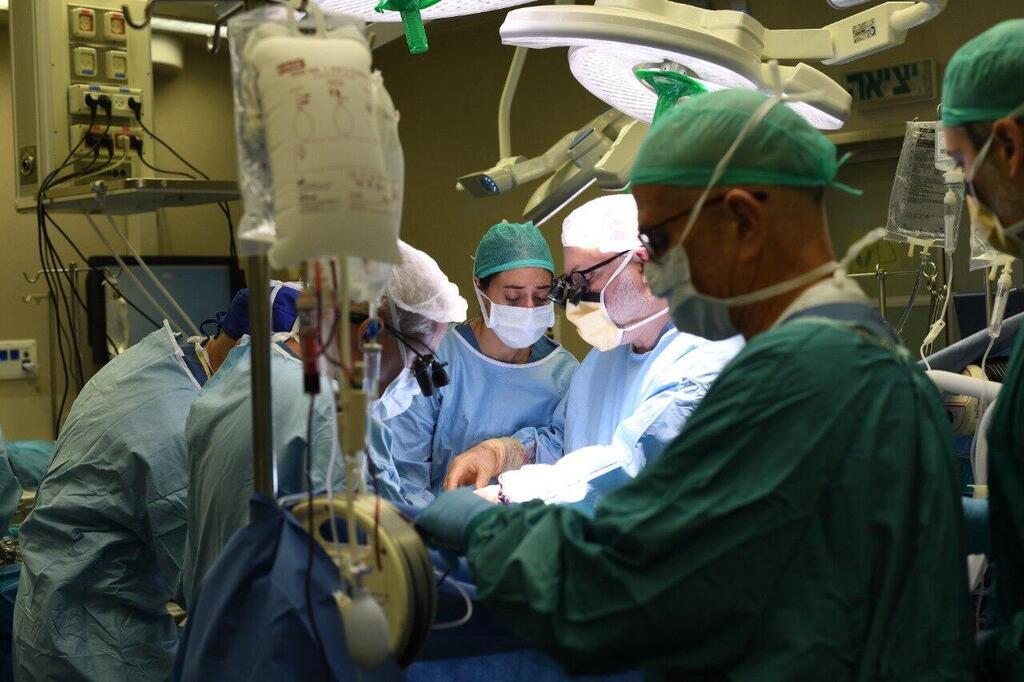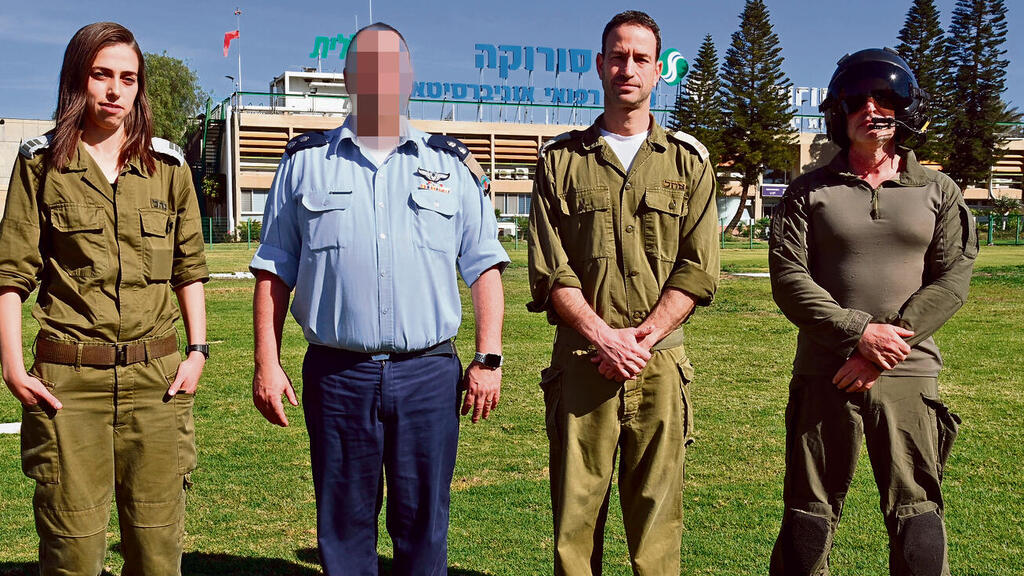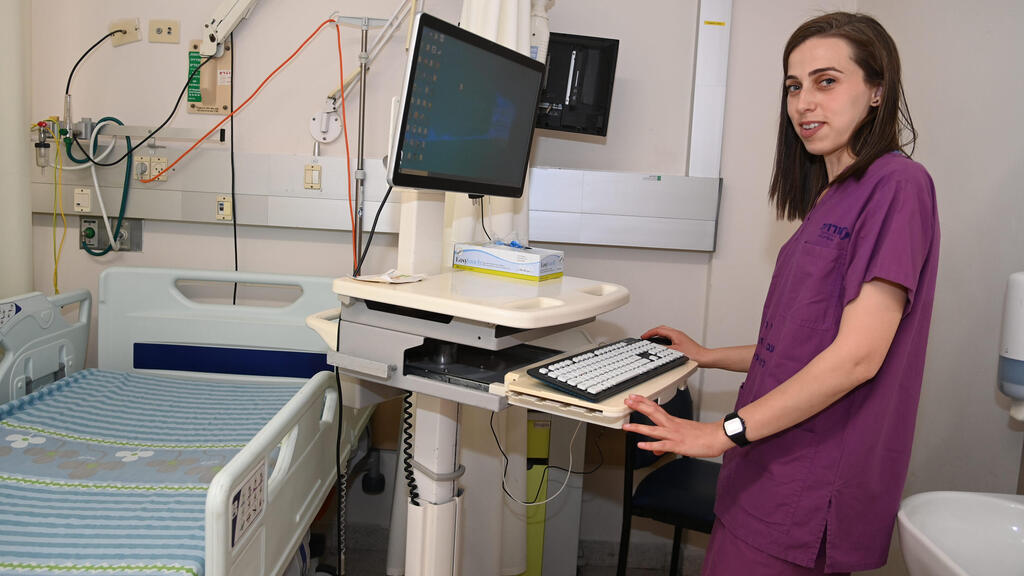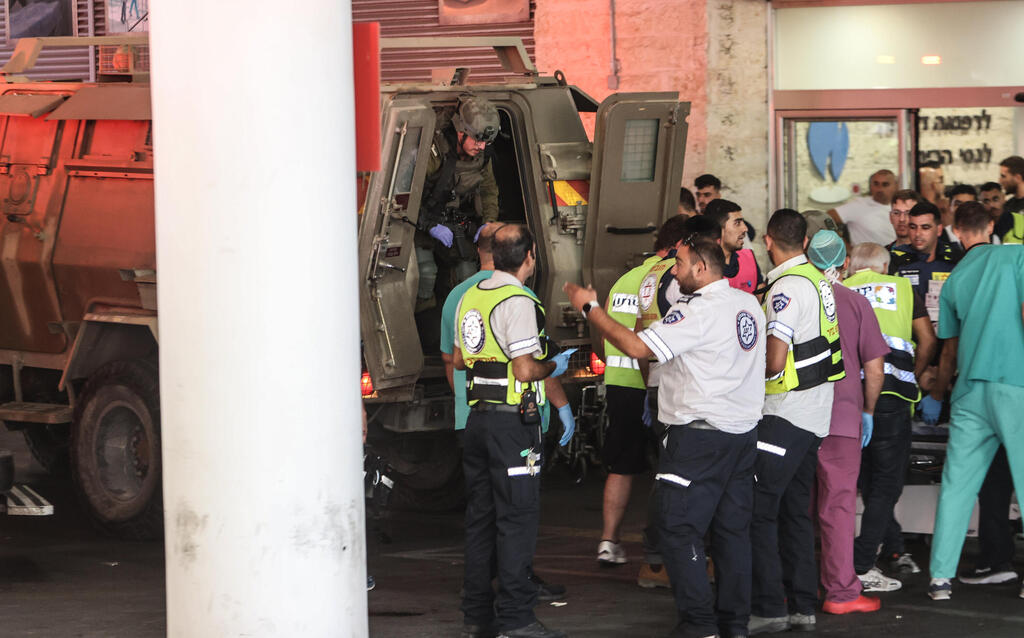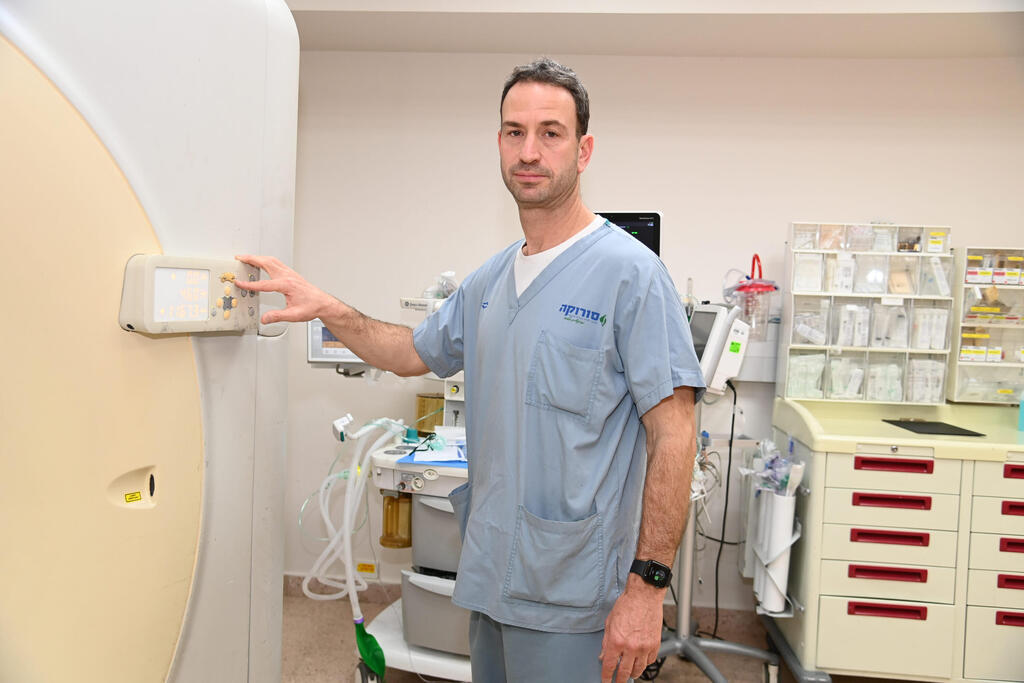Getting your Trinity Audio player ready...
Just like an action movie protagonist, Dr. R., 53, father of two, is a senior surgeon at Soroka Medical Center by day and a combat-soldier-come-doctor in the elite Search and Rescue Unit reserves by night. After daring rescue operations in Gaza treating the wounded under fire and evacuating by helicopter, he lands, changes into his scrubs, and carries on treating the wounded fresh in from the field.
"On October 7, I was at the hospital managing the orthopedic wounded, accounting for over half the wounded arriving at Soroka that day," Dr. R told us from his hospital department.
"Military operations experience helped me deal with that Saturday’s craziness very well. Quickly, we were in full control of the situation, despite the huge numbers we’d never encountered before. I’ve been serving as an operational doctor in the reserves since the Second Lebanon War, but this round of fighting is the most intense ever, as are the nature and complexity of the injuries."
“My work with the Search and Rescue Unit starts with the forces on the battlefield” he explained. “Another force transfers the wounded to the helipad where a helicopter waits for them. This evacuation chain, under fire, significantly reduces the death toll among the seriously wounded. Our activities cover the whole country and include civilian and military casualties, so we meet various types of wounded. Until the helicopter door opens, we never know who we’re going to meet.“
Tell us about a case that particularly affected you.
"When I was on reserve duty, we evacuated a soldier who I continued to treat in the hospital until he was discharged for rehabilitation. I treated him on the battlefield. It means a lot when you accompany someone who arrives in a serious condition until the moment he’s discharged and goes home. I also treated a soldier from my own unit. These success stories give you strength as a doctor, soldier and citizen. It’s not always a success story, but you try to remember the good things."
Dr. Leanne Dym has been serving in the Carmeli Brigade on the northern front since October 7. In peacetime, she specializes in gynecology, and in wartime, she’s a doctor in the Golani Brigade reserves. “I always wanted to be a doctor, but mainly because the way patients were treated didn't line up with how I thought it should be done,” she said. "I was raised in Rehovot, but I fell in love with Soroka. I worked hard during the three years of my residency, but the real test began on October 7."
"By noon, I’d been drafted to my reserve duty unit in the north. At first, they thought it would just be a short thing, but it carried on beyond all expectations. We didn’t have phones in the field, so we didn’t know what was going on in the country until we went home almost a month later. Traveling home, I saw signs up with pictures of the hostages. These are things you don’t know about when you’re in the field. I rested for the weekend and went straight back to the army until further notice."
What’s more important, being in the field or at the hospital?
"They’re both very important. Every soldier in the field must get the best medical treatment possible, but I also have residents at Soroka pulling more shifts, often working 24 hours straight, all while their husbands are on reserve duty. Everyone’s been drafted. A crazy number of doctors have been called up. Dr. Sharon Pearlman, a gynecologist at Beilinson Hospital took on the task of dealing with equipment shortage. She ran the Brothers in Arms logistic center providing medical equipment they only could have dreamed of in the field."
"Even people who have been called up are giving their time. There’s a WhatsApp group of doctors from all over the country answering questions from soldiers in the field. There’s a group of department heads dealing with stuff around the clock and doctors are receiving patients at their clinics voluntarily.
What you’re seeing among the people of Israel, you’re seeing in the medical profession. I enlisted in the army due to the religious Zionist values on which I was raised, including the love of our people and homeland. I continued in the reserves as a doctor to ensure that every soldier knows we’ll do the very best for him and I stayed here because of the amazing people in the battalion.”
Dr. D.,40, married and father of three, lives in a kibbutz in the northern Negev and is a senior doctor in the Commando Brigade. Although he learned to emotionally dissociate while serving in an elite unit as a surgeon, the events of October 7 still affect him today.
“I always wanted to practice medicine, but I never felt that security was for me,” he said. “When I saw what surgery was about, I was certain that’s what I wanted to do. Toward the end of my studies, I went to the medical unit in the Commando Brigade that always needs surgeons.”
Where were you on October 7?
"I observe Shabbat. I was at home with friends during Simchat Torah and at 6:30 a.m., we heard lots of explosions but there were no sirens. The phone started ringing at 7:45 am and by eight o’clock, they’d declared a mass casualty incident (MCI).
"The hospital’s director-general sent out a message telling everybody to show up. I was in the trauma room 20 minutes later, among all the chaos. All the beds were taken and teams from all the hospitals were coming in, including senior doctors and deputy directors. And the wounded were flooding in. We took on anyone brought in, treated them, and decided where to send them. As soon as they were out, we’d change over the equipment and the next injured person would come in. We made sure to treat everyone."
What did you do in the hospital?
"The whole unit was called up. When I saw what was going on at Soroka, however, I told them I couldn’t leave the department and reported for reserve duty a few days later when things had calmed down a bit. I then started remembering what I’d seen and hearing stories. Surgeons have shields. We’re very cynical and rather indifferent and you always tell yourself that it’s not connected to your own life, but these were the worst days of my life. My whole defense mechanism collapsed."
Dr. D.: "A woman from Be’eri who’d been shot in the chest came into the ER and, with her last breath, tried to understand what had happened to her family. 'I know my husband and baby have died. Just find out for me what’s with my other children.'
"There was a boy from Holit who’d been shot and had been lying under his parent’s bodies and there was an elderly grandmother from one of the kibbutzim who, when we asked her how she was feeling, responded 'My granddaughter’s been kidnapped to Gaza.' I found myself bursting into tears on duty."
"This was when I felt I needed my reserve duty buddies by my side. I left to join my unit on October 11 and was placed in commando units in Khan Younis. The device that killed one soldier and injured more blew up only a few feet away from me. I had to treat wounded soldiers fast, under fire, in very hostile environments and make quick decisions in the field so I didn’t have time to deal with the situation around me.”
For the past two months Lieutenant Colonel (res.) A, a senior surgeon, has slept almost every day in his office at the hospital, in his pilot’s uniform. "As a senior doctor, I treat and operate on all kinds of trauma patients," he said. "We’re used to trauma incidents at Soroka, so while the first days were very challenging, the war caught us prepared. We quickly got organized and started functioning like a war machine, dealing with a large volume of wounded people."
A. was overseas on October 7 "but when I got back, I immediately joined the reserves alongside hospital shifts. As we’re the only trauma center in the south, the wounded were showing up here much faster than the hospitals in the center of the country. The seconds between life and death are critical and the greatest challenge was sustaining a routine, keeping our strength up, and staying in control of such a major event in a very short time."
And in the army?
"I served as a pilot in my regular service, and in the reserves, I’m an officer in a unit that provides support to forces on the ground. We have all means available: fighter jets and helicopters, UAVs, etc. and we match the correct armament to each mission.
"On quite a few occasions, I’ve been in situations where I later treated the wounded in hospital. At the start of the fighting, I went to the hospital as a reservist to see how I could help. Just then, the staff brought in soldiers who’d been very badly injured by an explosive device. Ordinarily, we see less of these kinds of injuries.”
“There were cases when I couldn’t disassociate and talked about it in the emotional processing sessions we had in the army. Being a doctor, reservist, combat soldier, and citizen when your ecosystem has been damaged is no trivial thing.
"I take shifts both in reserves and at Soroka and I feel I want to give more to both. And in the middle of all of this, I have my children and family and I worry about them when rockets are fired. I’ll stay in reserve duty for as long as I’m needed. My role is unique as I’m one of the more experienced in my unit, and that’s important for the war."
Diagnostic Radiology specialist, Dr. Gal Ben Arie, 45, lives on Moshav Klahim that terrorists tried to infiltrate on October 7. "The security team was called to action, and as part of the community’s emergency team, I was there" he recalled.
"I was also on call at the hospital and got myself to Soroka when they declared an MCI, leaving my wife and children alone in the house on the moshav. I arrived at the hospital together with the first ambulances and very quickly the wounded, soldiers and young people from the festival - started streaming into the ER. We realized this incident was on a scale we’d never seen before. I was at the hospital until 5 am when I got a call from my reserve duty unit."
What do you most remember about that day?
"In the afternoon, I transferred a wounded patient to a CT bed and suddenly realized it was someone from my moshav. He used to help me with the gardening, and now he was a soldier lying here wounded on the bed. I wasn’t sure how to talk to him, whether or not I should tell him who I am.
"He was severely injured in both eyes and couldn’t see me. Ultimately, I decided to just try and relax him and not open up something I found difficult to deal with. I’m glad to say he’s alive and rehabilitating both physically and emotionally. I still haven’t told him about his moment with me."
And then you go off for reserve duty.
"I’m a doctor in the 12th Division, the medical Negev division. I asked to report for duty and waited for someone from my team to replace me. Everyone was hugely dedicated and people who weren’t on call just showed up without asking questions. Doctors sat in front of computers for 24 hours straight to give answers to keep everything running smoothly. Thanks to them, I could go to reserve duty, as my family was evacuated to the center of the country."
"We were among the first units to enter the northern Gaza Strip. I entered Gaza multiple times to treat wounded soldiers and was discharged a month ago. Now there’s talk of going back in. What’s keeping me optimistic is everyone’s devotion and commitment when something like this happens. Everyone just leaves everything and simply shows up to help and contribute. That says it all. I’m proud to live and work in a place where people care about each other."



